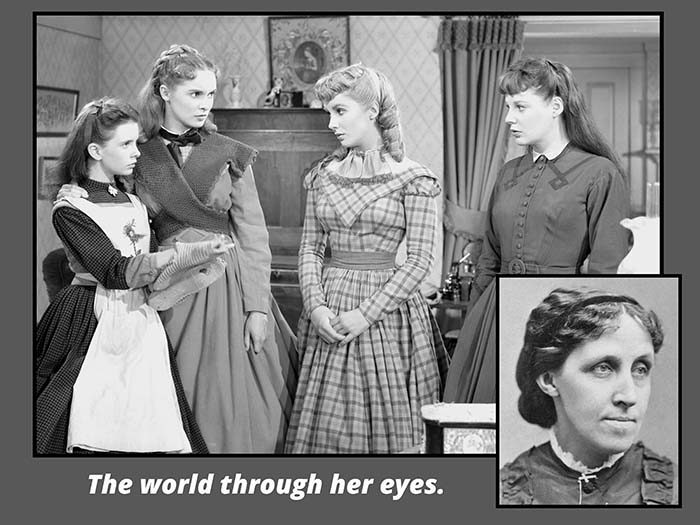She is buried in a little cemetery in Concord, Massachusetts, called Sleepy Hollow Cemetery. Fittingly, her “place of rest” is on a hillside there called “Authors’ Ridge.” She is near the likes of Ralph Waldo Emerson, Nathaniel Hawthorne, and Henry David Thoreau.
I’m speaking of Louisa May Alcott, who died at the age of 55 in 1888. She had a fatal stroke just two days after her father passed away.
Whenever I see a photo of her, I am struck by her appearance. Her eyes seem very sad to me and tired. I am always trying to read into these things, thinking that perhaps she felt despondent about her life or didn’t feel like going on.
No matter either way, because Louisa May Alcott is best known for her writing, specifically her novel, Little Women, which was bordering on autobiographical.
She had an editor friend who worked at a publishing house, Thomas Niles. He urged her to write a “simple” book about girls. Louisa much preferred to write suspense novels. But. In May 1868, she wrote in her journal, “Mr. N wants a girls’ story, and I begin ‘Little Women.’… I plod away, though I don’t enjoy this sort of thing.”
Yet she wrote the story indeed. And in her pages, her eldest sister Anna became dutiful Meg. Her true-life headstrong self, Louisa, became Jo. The artistic one of the girls, May, became Amy. And finally, her sweet sister Lizzie, who had died of scarlet fever, became doomed Beth. Their Marmee was Marmee. And then there was her dad. In the trueness of things, he had been emotionally absent because of his depression. However, in the novel, he became physically absent because of his heroic service in the Civil War.
Alcott wrote that book in two months. Halfway through, she delivered twelve chapters to Niles, confiding in her journal, “He thought it dull; so do I.”
But that all quickly changed after Niles gave it to some young girls as a test audience. Those youthful readers thought it was grand. Alcott wrote in her journal considering their approval: “As it is for them, they are the best critics, so I should be satisfied,”
Smartly, serendipitously, she was advised by her publisher to retain the copyright. This guidance made her a fortune.
As soon as Little Women was released, the book was a hit, and that good Louisa May Alcott was an overnight literary star. She always felt extremely grateful to have financial stability. On the other hand, she didn’t like the attention of the public acclaim
But throughout her life, it seemed she wanted to be different. She would hike up her skirt around her legs and take long runs through the woods. She encouraged other girls to do this, saying it was every bit their right to run if they wanted. A constant supporter of equal rights, Alcott was an abolitionist and a feminist and remained unmarried throughout her life. All her life, she was active in such reform movements as temperance and women’s suffrage.
Finally. When adoring fans would knock on the door of her home? She would pretend to be a servant and usher them away.
Sometimes, when I look back in history, there are certain people I think I would have liked to have known. At least to sit down over coffee and chat things up for a while. Louisa May Alcott is one of them. She probably had a lot to say about things, and I would have liked to listen.
The people in our everyday lives have a lot to say too. And sometimes it is good to listen. Other times, we need to continue on with our own stories.
=========
“I am not afraid of storms, for I am learning how to sail my ship.”
― Louisa May Alcott, Little Women
=========
“Far away there in the sunshine are my highest aspirations. I may not reach them, but I can look up and see their beauty, believe in them, and try to follow where they lead.”
― Louisa May Alcott
========
“I ask not for any crown
But that which all may win;
Nor try to conquer any world
Except the one within.”
― Louisa May Alcott
=========
She wasn’t a little woman at all
